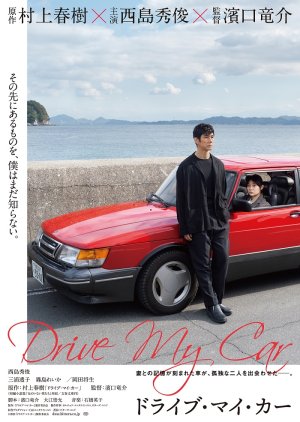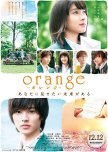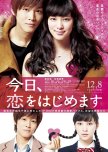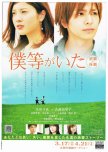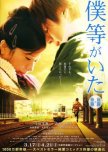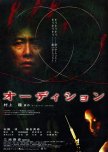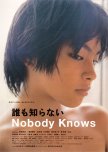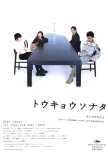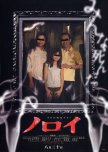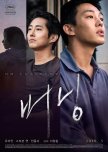
Their mouths were filled with words, but their souls were clothed with the unsaid.
The very first week of February, I have realized that I have always desired to live between the borders of the city and the countryside. I both want the busyness of the city and the passive greenery of the countryside; just like how I always found Iceland fascinating with its crisp weather spring and cold, wrathful volcanoes and glaciers.As I watched Drive My Car, it seemed like I was able to dwell between such paradoxical parallels. I, myself, was in that red Saab 900 having a trip around all my own melancholia, detachment, joy, death, transformation, grace, and, perhaps, hoping that my final destination would be life, itself.
We, the audience, are actually the red Saab 900. As the car took its ride everywhere, it saw the sunny cities only to be blocked by hard, metal and concrete buildings. It hears of the city's sweet promises of opportunities, only to be disturbed by the rushing expressways. Then, it goes a little further from the city only to witness that the natured trees and floras were cold with thick snows. This was also how we perceive the characters in the film: there was beauty and brokenness within them.
Anton Chekhov's Uncle Vanya was featured in the film in which the main protagonist was working to direct an adaptation of the play using multiple languages: Filipino, Mandarin, Japanese, Korean, Malay, and even sign language. In spite of its multilingual feature, there is a certain silence or repression imprisoning the film. Their mouths were filled with words, but their souls are clothed with the unsaid.
The silence embracing the film, though, was greatly rich. There were some parts that I was close to shedding a tear even though there were no exaggeratedly loud neither emotively suggestive background music and acting performances. It was not emotionally manipulative and it truly was its genuine intentions and authenticity that moved me.
Drive My Car truly moved me that I didn't even realize that it could be slow. That slowness, though, was very purposive. For that's how it is to go through grief and to wait for life. It can be slow, as if you are being sucked out of life and light. How could you expect a film about grief and healing to move so fast and quick?
Towards the epilogue, Misaki was seen buying her groceries and driving the red Saab 900 with her new friend, a dog (which made me squirm a little for how adorable it was). At that moment, I understood that life is not the final destination. Life, itself, is the journey. For life does not stop, but it keeps going on. The dead has reached their destination already, but, we, the living, must keep going on with the journey. Keep driving your car, humans.
†† † † † ‡
"What can we do? We must live our lives. Yes, we shall live, Uncle Vanya.
We shall live through the long procession of days before us, and through the long evenings; we shall patiently bear the trials that fate imposes on us; we shall work for others without rest, both now and when we are old;
and when our last hour comes we shall meet it humbly, and there, beyond the grave, we shall say that we have suffered and wept, that our life was bitter, and God will have pity on us.
Ah, then dear, dear Uncle, you and I shall see that bright and beautiful life; we shall rejoice and look back upon our sorrow here; a tender smile -- and -- we shall rest.
I have faith, Uncle, fervent, passionate faith."
Was this review helpful to you?

A beautiful three hour long journey ride
Hamaguchi Ryusuke released two amazing films in 2021, Fortune and Fantasy and Drive My Car. I have to say this, Drive My Car is such a beautiful movie. Please watch "Drive My Car" (2021) it's a three hours long movie, it takes you on a beautiful ride. The screenplay of this movie is so well written. I am so happy this movie got nominated for OSCARS. Drive my Car is the best first Japanese movie to be nominated for the BEST PICTURE. I am so happy! In fact, there is another movie by Hamaguchi Ryusuke you must watch, that is "Happy Hour".Was this review helpful to you?
This review may contain spoilers
Uncle Vanya after a nuclear disaster.....!
That must have been the most overrated, over hyped, unjustifiably long and pretentious film I've ever seen. I don't know and I can't even imagine why this film got so many awards.For me at least was an unsuccessful attempt to convey with some beautiful cinematography and pretentious moody acting some very questionable ideas.
BE AWARE SPOILERS AHEAD
Fukaku Yusuke a stage actor and director, who is repeatedly cheated by his wife Oto , feels cheated. ( how original!!)
The messed up by the death of their child wife Oto, cheats on him and has sex with her lovers even in their own home . Having sex with her husband and other men is a very inspiring process for her though, because it makes her create stories that made her a famous screenwriter. Fukaku Yusuke's wife dies at some point from natural causes and he feels, - on top of being cheated- guilty because he wasn't able to save her.
Two years later, Misaki becomes Yusuke's driver for the duration of his stay at Hiroshima, where he is assigned to direct a stage play, ( Uncle Vanya by Anton Chekhov), In the process we learn that she feels anger and hate for her psycho mother who brutally abused her when she was a child. Her mother dies in a natural disaster accident and Misaki feels guilty too because she didn't want and probably wasn't able to save her.
Takatsuki Koshi a young idol actor and one of Yusuke's wife's lovers is cast to play Uncle Vanya in the stage play that Yusuke is directing, a multilingual adaptation of this stage play where all the actors and the actresses of the cast speak a different language. Japanese, Korean, Chinese, and even sign language ( I don't know what could have been the purpose of such an adaptation. If the concept after all was to make the audience of the play read over titles then it should have been a more valid option to play Uncle Vanya in Russian!!).
Takatsuki's career is messed up too after being caught up to have an affair with a minor.
During the rehearsals of the play, assaults a guy who photographed him without his consent and afterwards he is lecturing Yusuke about how truthful in her ideal was his wife, how much she loved her husband ( !!) and how inspirational and deep was for her to f@ck with other men (including himself of course!) The guy he assaulted dies after a while at the hospital.
And then we get to the point ( at last). And the point is that Yusuke shouldn't feel angry and he shouldn't feel wronged because his wife was after all true to herself, ( even though she wasn't true to him) that Misaki shouldn't feel this way about her mother, because her mother was also true to herself (even though she had a multiple personality disorder !).
But the same absolution doesn't apply in the case of Takatsuki who ends up being arrested even though he was probably equally true to himself and his intentions when he assaulted and eventually killed the guy who took the photo.
And that's what the movie is all about. Almost three hours of beautifully filmed but completely pretentiously acted attempt to persuade us that everything is fine as long as we take other people's shit as they are, hoping perhaps that things will get better in the ... afterlife... ( ??) ha ha haaa
4 out of 10 from me just for the sake of the cinematography.
The plot sucks and it's intentions are at least questionable.
Was this review helpful to you?

"Those who survive, keep thinking about the dead"
Drive My Car was a slow, agonizing, peeling away of emotions and denial, much of the revelations taking place in a red 2-door Saab. “Uncle Vanya” by Anton Chekhov served as therapist, burrowing into the actors and revealing buried questions and regrets.“What should I do about my life and love?”
Yusuke and Oto have been married for 20 years. After the death of their daughter a decade before the light went out of their lives. Oto is a screenwriter who uses sex as a muse and to fill the emptiness inside her. Yusuke left television acting and now works in the theater. All is not as blissful as it seems between the two when tragedy hits. Two years after Oto’s death, Yusuke travels to Hiroshima to direct his version of “Uncle Vanya” that is a multi-lingual production. He is famous for his interpretation of Uncle Vanya but after Oto’s death he’s been unable to process the emotional anguish of the challenging part. The Festival director insists that he have a driver and assigns a young woman to transport him while working on the play. His driver, twenty-three-year-old Misaki, quietly carries her own burden of guilt.
“However, the world had changed to something sinister.”
Drive My Car took a rather in-depth look at play auditions, readings, and the revelations to actors and audience. This play was unique in that each character spoke a different language-Japanese, Mandarin, Korean, Korean sign language, and Tagalog. A screen displayed all four languages for audience members, but it got me to thinking. How well do we truly understand people, even people we love, when speaking the same language? The film asked if it’s possible to truly understand another’s secret heart. How often do we shy away from asking the important questions for fear of the answers? And how much pain does it cause to not be asked those pertinent questions?
“If you really want to look at someone then your only option is to look at yourself squarely and deeply.”
Nishijima Hidetoshi brilliantly showed how Yusuke wore his serene demeanor like impenetrable armor. Subtle cracks revealed his pain, guilt, anger, and sorrow. The cassettes Oto had recorded for Yusuke to practice his lines felt like accusations and pronouncements of their marital relationship. If Yusuke wore a suit of protective armor, Miura Toko’s Misaki had built a fortress of stone around her heart. The two strangers went from traveling in silence to coming to understand that they had more in common. Okada Masaki played an actor who had ties to Oto and deeply disturbed Yusuke’s calm bubble, but in shaking Yusuke up, he also revealed a stunning secret.
“I let something genuine slip by.”
Drive My Car’s story unfolded deliberately, with tiny revelations chipping away at Yusuke and Misaki’s walls. The catharsis of Uncle Vanya unrelentingly bored into their hearts uncovering deep wounds, bringing them into the light for healing. Guilt and regret are the sharpest of blades that can only be dulled with understanding and forgiveness. And a little time of self-discovery in a 1987 red 900 Turbo Saab.
13 November 2024
Was this review helpful to you?
Driving through ground zero
The central moments of this story takes place in Hiroshima: and it is symbolic of the devastation that rips through the thin veneer of coping that the main character has plastered over his wounds.Throuh the repeated readings of of dialogue of Chekhov's Uncle Vanya, the themes of infidelity, wasted lives and lost opportunity is explored. I love the way in which the play-within-a-play accents the sensitivities and the unspoken anguish of the main character.
One young girl keeps on driving .. which is an important aspect of living with grief: to go on, to do the work, and she grounds the film, hugging a dog, showing Hiroshima restored, driving west until her car packs up..
I The Chechov lines chrechendo's on a landslide scar, the resolution to the grief comes in a spetacular culmination at the end of the Uncle Vanya performance, and when you think it is over, the film (and life) goes on.
It is a masterpiece, and if you can watch sixteen hours of Kdrama, you owe it to yourself to spend the time on this.
Was this review helpful to you?

A masterful pairing of writing and directing
Layers."Drive My Car" is a long movie. A really long movie and there's some sections where it seems like there's not a lot going on. But Ryusuke Hamaguchi is very deliberately and delicately creating one subtle layer of meaning and complexity and understanding and connection on top of another.
Yusuke and Oto are married and happily so. Or so it seems. And then Oto is gone. Yusuke, an actor with a peculiar method and a specialty in Chekhov's "Uncle Vanya" presses on with his professional life as if all is well. On the surface, so it seems.
And then, Hamaguchi pulls back a bit of the veneer and reveals a bit more. Very slowly, Yusuke and Misaki, his assigned driver, in their own stilted ways, reveal who they really are to each other. Their past relationships align as opposites, one mostly light but with a darkness hidden away, the other abusive but with moments of compassion.
And as Yusuke and Misaki become something other than driver and passenger, Yusuke's work assembling the production of "Uncle Vanya" at a festival in Hiroshima is assembled, slowly, piece-by-piece. There's a marvelous interplay between the play production as it slowly goes from audition to table reading to rehearsal to live performance and the primary movie narrative. And the final scene of the play with Park Yoo Rim brings the two stories together and it is incredibly powerful.
If there's a weakness, it's a sudden transformation of a supporting character from a shallow and impulsive charmer to an introspective and insightful thinker. The scene is necessary for the narrative, but it's jarring.
Long movie but absolutely worth it. Highly recommend.
Was this review helpful to you?

It's not everyone's cup of tea
First of all, this is a long movie, 3 hours.I intrigued because this movie be in prestigous film festival like Cannes and won Best International Feature Film in Oscar 2022.
Need extra attention especially understanding their dialogue because many of the story link take place in their dialogue. It's like a story telling through naration.
The explanation about one scene may revealed by analogy of other's story or scene
Toward the end, every viewer may find their own interpertation of what they want to understand toward the story.
Was this review helpful to you?

Digna representación del cine japonés.
No me considero fan de las obras de Murakami Haruki, de hecho, he leído dos de sus obras y honestamente, he chocado mucho con ellas, definitivamente no es mi autor japonés favorito y la obra en la que se basó esta película, no la he leído. A pesar de lo anterior, debo decir que la película es una belleza, empezando por ese guion exquisito lleno de frases memorables (que igual, siento que es el mayor fuerte de este filme) en el que nos lleva por diversas etapas como es la lujuria, el duelo, el soñar, el arrepentimiento, y, las varias escenas llenas de silencio que te lo dicen todo gracias a la capacidad actoral de un reparto con actuaciones satisfactorias y una fotografía muy bonita llena de paisajes y nuestro viejo auto rojo.A pesar de su belleza, es una película que no es lo más original del mundo (de hecho me recordó mucho a otra película japonesa que vi de Motoki Masahiro -The long excuse-) y sí, es excesivamente larga, muchas escenas pudieron haberse cortado y/o eliminado y siento que la película hubiera transmitido la misma sensación y el mismo mensaje al auditorio.
"Drive my car" representa bien lo que es hoy en día el cine japonés, esa forma en la que nos cuentan la historia de una forma que puede ser muy lenta para algunos, pero llena de detalles que te deja los sentimientos a flor de piel, por lo que tal vez no sea una película que pueda disfrutar al 100% todo el mundo.
Was this review helpful to you?

"Diriger ou être dirigé ?", telle est la question
Difficile d'aborder la critique de Drive My Car, tant la diffusion de ce film fut précédée d'attentes fortes de ma part. Meilleur scénario à Cannes en 2021, dernier film d'Hamaguchi et surtout Nishijima Hidetoshi en vedette. Sur le papier, il a tout pour (me) plaire. Mais la hype grandissante ces derniers mois, ses 3h00 de durée affichée au compteur et une adaptation d'une toute petite nouvelle de Murakami me laissa perplexe. On le verra, avec une durée digne d'une pièce de Tchekhov, ce film est capable du meilleur comme du pire, comme tout Hamaguchi et Murakami d'ailleurs. La route risque d'être longue, sinueuse, ennuyeuse parfois, mais riche de découvertes sur les autres et sur soi-même. Alors attachez votre ceinture, car cette Review va vous conduire au bord de l'introspection.Il est vrai que j'aurai mis du temps à voir ce film, sortie en plein été en France, certainement à la va vite, puisque tout juste auréolé de sa palme du meilleur scénario. Il fallait donc vite exploiter le filon pour le distributeur. Mais avec une seule diffusion en plein milieu de la journée dans un seul cinéma du département, j'ai loupé la première salve. Parce qu'une deuxième n'est évidement pas exclue aux vues des nominations, en ce début 2022. Golden Globe, Oscar, ... Ah... quand les Américains s'en mêlent, cela va probablement ouvrir de nouveaux horizons à ce road movie d'un nouveau genre. Et en particulier à Ryūsuke Hamaguchi qui je l'espère augmentera son audience au-delà du cercle restreint des amoureux du cinéma cannois (comprendre : retraités de la fonction publique - bobos - urbains)
On a effectivement affaire ici au dernier film d'un des fleurons de la nouvelle vague cinématographique japonaise. Habitué des festivals classieux/prétentieux, Hamaguchi peut fasciner autant que décevoir. Ses films sont à la fois vus comme de chefs-d'œuvre de sensibilité, mais aussi extrêmement présomptueux. Asoko I, II n'avait enchanté alors que Senses m'ennuyait profondément, par exemples. En 3h Drive my car ne pouvait pas échapper à ses deux facettes du réalisateur, sans que vraiment l'une prennent le dessus sur l'autre d'ailleurs. Tout sera donc question de goût et de sensibilité.
Il faudra, comme souvent, passer les premières minutes, ici très racoleuses, pour toucher au cœur du film. Hamaguchi nous réserve (à nouveau) une trop longue introduction de 30 min qui laisse planer le mystère. Mais qui en fait trop côté scènes éroticos-intellos, à mon sens. Dommage cela pourra rebuter la vision du film dans son ensemble, qui commence réellement après des évènements et des révélations d'une certaine intensité. En considérant que l'histoire débute vraiment à Hiroshima, l'œuvre prend toute sa dimension et clairement, on sent qu'on s'éloigne de la nouvelle originale pour le plus grand bien du film et du spectateur. La partie métaphysique des 30 premières minutes laisse place enfin à des introspections sur les personnages et se déroule alors, devant nos yeux, une galerie de portraits originaux, rafraichissants et extrêmement humains. Très loin des premières minutes, montrant un couple trop parfait. L'un metteur en scène/acteur installé et respecté, l'autre scénariste de génie et tous les deux filant le "parfait" amour depuis des années. On sait bien que dans le Showbiz rien n'est parfait, mais là, le glamour en devenait écœurant jusqu'à ce fameux changement de contexte.
On trouvera dans ce film un foisonnement de thèmes qui vous toucheront :
Comment continuer à vivre avec l'absence de l'autre ? La reconstruction qui aurait pu d'ailleurs être symbolisée par Hiroshima, même si le réalisateur s'en défend. Le deuil, la culpabilité, la solitude, la transmission, la folie parfois proche du génie, etc ... Mais un contexte également, qui à lui seul justifie de si nombreuses nominations ou distinctions pour le milieu du cinéma.
On sait bien que jouer une personne ayant un fort handicape ou un biopic assure une distinction dans ce genre de festival, mais le milieu adore aussi se regarder le nombril. Et quand les thèmes principaux sont les acteurs, les metteurs en scène ou le théâtre classieux pour pas dire classique, l'Oscar n'est pas très loin. S'autorécompenser sur des films "intellos", c'est d'une certaine manière se racheter des Avengers et autres Star Wars qui rapportent tant de fric au cinéma, mais si peu de neurones aux spectateurs. Une schizophrénie dont sont affligés tous les bons acteurs et Nishijima Hidetoshi n'y échappe pas. Autant son jeu est extrêmement mauvais dans le récent drama Shin Hannin Flag, autant il mérite amplement ici la récompense du meilleur acteur. Qu'il aura d'ailleurs peut-être eu à l'heure où vous lisez cette critique encore plus longue que le film
L'amour du théâtre et des acteurs dégouline de ce film et moi qui n'y connais pas grand-chose, je me suis mis à m'intéresser (un peu) à Becket ou à Tchekhov. Ses longues pièces de théâtre plus ou moins contemporaines, parfois ennuyeuses, souvent prétentieuses, mais qui posent un regard sur la condition humaine ne rentrent pas seulement en résonance avec le film. Elles se confondent, sont absorbés jusque dans les longs dialogues dans cette voiture, qui malgré ce que l'on pouvait croire n'est pas le centre d'intérêt majeur du film. C'est vraiment cette mise en scène et ses jeux d'acteurs qui fascinent. Le scénario, un peu certes, mais on a le temps de le détricoter en 3h. Quelques Twists intéressants vous surprendront peut-être, mais ne vous attendez pas tout de même à un effet Ouahou !
Hamaguchi s'est amusé à reprendre les situations en réel des pièces et vous vous amuserez probablement à trouver tous ses clins d'œils classieux.
Le casting cosmopolite joue certainement aussi en la faveur de récompenses internationales, mais je ne pense pas qu'il y avait des arrières pensés United Colors of Benetton. D'ailleurs Hamaguchi avait bien l'intention de tourner en Corée, s'il n'y avait pas eu la pandémie, histoire de bien effacer le passé du metteur en scène avec un cadre plus "exotique". Du coup, je ne sais pas comment les habitants de Hiroshima doivent comprendre le choix de leur ville...
Je n'ai pas beaucoup parlé des acteurs, puisqu'ils ont tous formidables et font partie du haut du panier d'acteurs de cinéma comme de dramas en Asie. Ils aideront par leur bienveillance, mais aussi par leur propre histoire, Nishijima Hidetoshi à lâcher prise, à se laisser conduire, lui si habitué à diriger les autres... et sa voiture.
Dans l'éventualité où vous aimez un tant soit peu le théâtre, le bon jeu d'acteur, les belles lignes de dialogues, longues, mais profondes de sens... et la Saab 300 Turbo, tout de même, vous vous laisserez conduire jusqu'à la fin, on ne peut plus touchante de ce film concept, qui vous rappellera que l'important dans un voyage ce n'est pas la destination, mais la route.
Was this review helpful to you?

